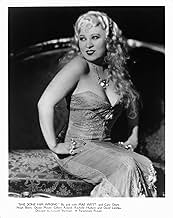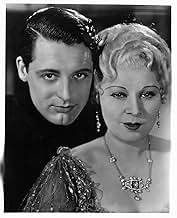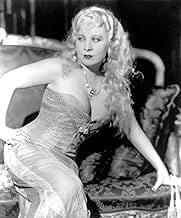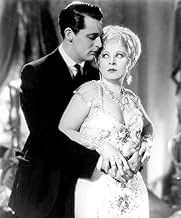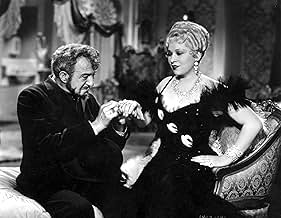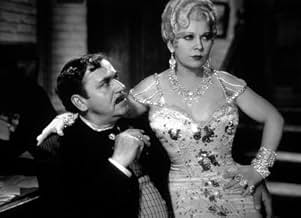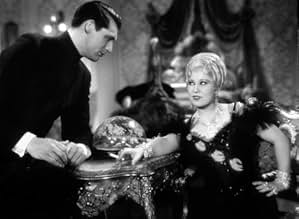IMDb RATING
6.3/10
7.5K
YOUR RATING
In the Gay Nineties, a seductive nightclub singer contends with several suitors, including a jealous escaped convict and a handsome temperance league member.In the Gay Nineties, a seductive nightclub singer contends with several suitors, including a jealous escaped convict and a handsome temperance league member.In the Gay Nineties, a seductive nightclub singer contends with several suitors, including a jealous escaped convict and a handsome temperance league member.
- Nominated for 1 Oscar
- 5 wins & 1 nomination total
Noah Beery
- Gus Jordan
- (as Noah Beery Sr.)
Robert Homans
- Doheney
- (as Robert E. Homans)
Ernie Adams
- Man in Audience
- (uncredited)
Billy Bletcher
- Singing Waiter
- (uncredited)
Wade Boteler
- Dan's Pal
- (uncredited)
Jack Carr
- Patron Who Hits His Girl
- (uncredited)
- Director
- Writers
- All cast & crew
- Production, box office & more at IMDbPro
Featured reviews
It's really a privilege to be able to see an icon like Mae West on film. This early talkie is Mae at her best - precode, dripping in diamonds and one-liners. It's a shame that later in life, she became a parody of herself. She was an important figure not only in theater but in early film.
Mae was not only a talented performer, she was a gifted writer and knew how to showcase herself. Though "She Done Him Wrong" is light on plot, it's heavy on Mae, and frankly, who cares about anything else? She's Lady Lou, a bawdy singer, with her hourglass figure shown to great advantage in a variety of gowns. All men want her - and let's face it, many men have had her! When she visits her ex-boyfriend in jail, she knows ever other con in the place.
This is a fascinating movie on so many levels. Besides Mae and her precode innuendos, it has Cary Grant's star-making performance (though Grant always disliked West's claim that she discovered him). It's the film that saved Paramount from bankruptcy. It's one of the films that brought on the code. Most interesting to me is, the audiences loved it! These audiences would very soon (like the next year) be deprived of the sexual double entendre and morality found in this film. Rather than the early audiences being naive and unsophisticated, it was the banning of certain language and situations in film that gave rise to the idea of a false world: that once, there were no shades of gray, all unmarried women were virgins, the bad guy always lost, and no bad deed goes unpunished.
"She Done Him Wrong" is a great chance to see a very young and handsome Gilbert Roland and Noah Berry Sr. (whose son really resembled him) in early film roles.
An amazing artifact, some hilarious lines, and most of all - Mae.
Mae was not only a talented performer, she was a gifted writer and knew how to showcase herself. Though "She Done Him Wrong" is light on plot, it's heavy on Mae, and frankly, who cares about anything else? She's Lady Lou, a bawdy singer, with her hourglass figure shown to great advantage in a variety of gowns. All men want her - and let's face it, many men have had her! When she visits her ex-boyfriend in jail, she knows ever other con in the place.
This is a fascinating movie on so many levels. Besides Mae and her precode innuendos, it has Cary Grant's star-making performance (though Grant always disliked West's claim that she discovered him). It's the film that saved Paramount from bankruptcy. It's one of the films that brought on the code. Most interesting to me is, the audiences loved it! These audiences would very soon (like the next year) be deprived of the sexual double entendre and morality found in this film. Rather than the early audiences being naive and unsophisticated, it was the banning of certain language and situations in film that gave rise to the idea of a false world: that once, there were no shades of gray, all unmarried women were virgins, the bad guy always lost, and no bad deed goes unpunished.
"She Done Him Wrong" is a great chance to see a very young and handsome Gilbert Roland and Noah Berry Sr. (whose son really resembled him) in early film roles.
An amazing artifact, some hilarious lines, and most of all - Mae.
It appears that some modern day critics have forgotten what a great period film is all about. This very authentic replica of the Gay Nineties (1890s) is accurate right down to the horse hair furniture, gas lamps, Brooklyn accents and costumes. It was adapted from Mae West's Broadway hit "Diamond Lil" and coupled with West's other 1933 hit (I'm No Angel), saved Paramount from bankruptcy. The film was so loved by audiences that midnight showings were needed to accommodate the crowds, and it was so lurid that seven countries banned the film altogether. It was nominated for the best picture of 1933 and was West's favorite of all her twelve films. The film introduced the famed line (although it's uttered slightly different in the movie) "Come up and see me sometime." Some of Mae's funniest work is here, and she sings three great tunes. Edith Head did all the costumes and Lowell Sherman directed. Modern times have dulled the bluntness of this film, but be assured, it was an eye-popper in 1933.
"She Done Him Wrong" is an early hit film for both Mae West and Cary Grant. West is Lady Lou and Grant is Captain Cummings. Other key players include Owen Moore as Chick Clark, Gilbert Roland as Serge Stanieff, Noah Beery as Gus Jordan, David Landau as Dan Flynn, and Rafaeta Ottiano as Russian Rita. The cast are all good and the story is interesting, if a little slow. Others describe the plot, and I thought some movie buffs would be interested in some of the background of the movie and the stars.
This film is credited as the movie that made Mae West a star. It was only her second film, but first lead role. She already had made her mark on Broadway where she acted in plays that she wrote for herself. In an introduction on the DVD of this movie, host Robert Osborne says that this film saved Paramount studios from bankruptcy. Paramount was due to go under, but the box office from "She Done Him Wrong" put the company back in the black. And, with Mae West as the studio's new star, Paramount continued on its track back as one of the big filmmakers. The movie also helped push Cary Grant's career. Grant had risen to male leads in three films the year before.
A check of histories elsewhere affirms that Mae West's two films in 1933 (the other being "I'm No Angel") were a boost to Paramount, but none attributed the recovery directly to that. The company remained in trouble for a time. Studio head Adolph Zukor is credited with pulling the company out of receivership. He had also acquired a number of other top stars along with West and Grant. Those included Claudette Colbert, Bing Crosby, Marlene Dietrich, Carole Lombard, Jeanette MacDonald, and the Marx Brothers. They all made some hit movies that helped restore Paramount's star.
Osborne related some interesting background on this movie. Mae West had written and starred in the hit 1928 Broadway play on which it is based, "Diamond Lil." But, when Paramount bought the movie rights, apparently the Production Code office notified the studio that there was no way it could make "Diamond Lil" into a movie. The play was far too racy for the motion picture industry's new standards. So, Mae West, the other writers and the director went to work to revise the film. The first thing they did was change the name. The new screenplay replaced racy dialog and scenes with innuendo and double entendre. Osborne said that Mae West later was quoted as saying that the Production Code led to better movies because the studios wrote better stories with innuendo and suggestion that made them much funnier than they were otherwise.
It's interesting too that West made only 13 films in her movie career. Three of those were more than two decades after she left Hollywood in 1943 to return to the stage and nightclub entertaining. She was 87 and living in Hollywood when she died in 1980. Of course, all those other names above from Paramount went on to become huge stars as well.
This is a good film, but nothing special. West made only two films considered very good –"'I'm No Angel" and "My Little Chicaddee." She was more of a sex symbol with a come-on persona, than she was an actress. She had some good years on stage, acting and writing, and she worked the nightclub circuit for most of her career. Here, West sings "Frankie and Johnny," which may be the first time that long-time popular American song was used in the movies.
This film is credited as the movie that made Mae West a star. It was only her second film, but first lead role. She already had made her mark on Broadway where she acted in plays that she wrote for herself. In an introduction on the DVD of this movie, host Robert Osborne says that this film saved Paramount studios from bankruptcy. Paramount was due to go under, but the box office from "She Done Him Wrong" put the company back in the black. And, with Mae West as the studio's new star, Paramount continued on its track back as one of the big filmmakers. The movie also helped push Cary Grant's career. Grant had risen to male leads in three films the year before.
A check of histories elsewhere affirms that Mae West's two films in 1933 (the other being "I'm No Angel") were a boost to Paramount, but none attributed the recovery directly to that. The company remained in trouble for a time. Studio head Adolph Zukor is credited with pulling the company out of receivership. He had also acquired a number of other top stars along with West and Grant. Those included Claudette Colbert, Bing Crosby, Marlene Dietrich, Carole Lombard, Jeanette MacDonald, and the Marx Brothers. They all made some hit movies that helped restore Paramount's star.
Osborne related some interesting background on this movie. Mae West had written and starred in the hit 1928 Broadway play on which it is based, "Diamond Lil." But, when Paramount bought the movie rights, apparently the Production Code office notified the studio that there was no way it could make "Diamond Lil" into a movie. The play was far too racy for the motion picture industry's new standards. So, Mae West, the other writers and the director went to work to revise the film. The first thing they did was change the name. The new screenplay replaced racy dialog and scenes with innuendo and double entendre. Osborne said that Mae West later was quoted as saying that the Production Code led to better movies because the studios wrote better stories with innuendo and suggestion that made them much funnier than they were otherwise.
It's interesting too that West made only 13 films in her movie career. Three of those were more than two decades after she left Hollywood in 1943 to return to the stage and nightclub entertaining. She was 87 and living in Hollywood when she died in 1980. Of course, all those other names above from Paramount went on to become huge stars as well.
This is a good film, but nothing special. West made only two films considered very good –"'I'm No Angel" and "My Little Chicaddee." She was more of a sex symbol with a come-on persona, than she was an actress. She had some good years on stage, acting and writing, and she worked the nightclub circuit for most of her career. Here, West sings "Frankie and Johnny," which may be the first time that long-time popular American song was used in the movies.
Mae West is another one of those actresses that played the same role time after time. She played Mae West. What distinguishes the movies are the lines and she was a masterful created of double entendre with a big load of sex. She would surround herself with the actors of the day, like Gilbert Roland and Wallace Beery. The one that benefited the most here was Cary Grant. It's hard to realize that he goes back so far. I have to admit that for mot of my life I found West's thing to be off handed and tiresome. But now I know that she had great timing and and interesting stage presence. She could deliver a "dirty" line like no other. This gave us the famous like, "Come up and see me sometime."
After a supporting role in the George Raft film Night After Night, Paramount films realized what a gold mine they had in Mae West. Between her and a young radio singer named Bing Crosby, they pulled Paramount from the brink of bankruptcy, the white mountain studio nearly went under in the early Thirties.
After this the studio gave Mae her head in choosing material and she decided to use one of her own original plays, She Done Him Wrong. The story is set in the Bowery district of the 1890s and New York of the 1890s is where Mae grew up, she had a good ear and a good memory for character types she uses in the film.
Mae always plays Mae West and would you really want her as anyone else? She's a Bowery entertainer of the period, working in this case for Noah Beery's club as the main attraction. Beery's into some really shady business, he doubles in white slavery and nearly gets innocent Rochelle Hudson who tries to kill herself in his club. Mae saves her, but turns her over to Beery because she doesn't know about his other sideline. All she knows is that he pays off in diamonds as well as cash.
Besides Beery panting after her, we've got silent screen star Owen Moore, young Gilbert Roland who is the assistant to white slaver Rafaela Ottiana and in the film that would be his breakthrough, Cary Grant as a Salvation Army worker who's not all he seems. Mae personally picked Grant for his role, he was a young Paramount contract player beginning to get some notice. But as I said before in my review of I'm No Angel, this is not a Cary Grant film, this is a Mae West film.
Mae besides being one of the great sex symbols of the last century had a great memory and eye for detail of the bawdy Bowery of her youth. Good thing she came along before The Code was put in place. Her first films are her best, The Code definitely hampered her style.
And Mae West if she had anything, had style.
After this the studio gave Mae her head in choosing material and she decided to use one of her own original plays, She Done Him Wrong. The story is set in the Bowery district of the 1890s and New York of the 1890s is where Mae grew up, she had a good ear and a good memory for character types she uses in the film.
Mae always plays Mae West and would you really want her as anyone else? She's a Bowery entertainer of the period, working in this case for Noah Beery's club as the main attraction. Beery's into some really shady business, he doubles in white slavery and nearly gets innocent Rochelle Hudson who tries to kill herself in his club. Mae saves her, but turns her over to Beery because she doesn't know about his other sideline. All she knows is that he pays off in diamonds as well as cash.
Besides Beery panting after her, we've got silent screen star Owen Moore, young Gilbert Roland who is the assistant to white slaver Rafaela Ottiana and in the film that would be his breakthrough, Cary Grant as a Salvation Army worker who's not all he seems. Mae personally picked Grant for his role, he was a young Paramount contract player beginning to get some notice. But as I said before in my review of I'm No Angel, this is not a Cary Grant film, this is a Mae West film.
Mae besides being one of the great sex symbols of the last century had a great memory and eye for detail of the bawdy Bowery of her youth. Good thing she came along before The Code was put in place. Her first films are her best, The Code definitely hampered her style.
And Mae West if she had anything, had style.
Did you know
- GoofsShadow of the boom microphone moves against the back wall of Lady Lou's apartment while she and Sally are talking.
- Alternate versionsMaryland, Massachusetts, New York, Ohio, and Pennsylvania removed the song "A Guy What Takes His Time". Will H. Hays and Adolph Zukor went to New York to edit the song to an entrance by Mae West, one opening verse, and one closing verse to lessen the suggestiveness. Despite this, Ohio and Pennsylvania cut all of West's one liners.
- ConnectionsFeatured in The Twentieth Century: The Movies Learn to Talk (1959)
- How long is She Done Him Wrong?Powered by Alexa
Details
Box office
- Budget
- $200,000 (estimated)
- Runtime
- 1h 6m(66 min)
- Color
- Aspect ratio
- 1.37 : 1
Contribute to this page
Suggest an edit or add missing content


